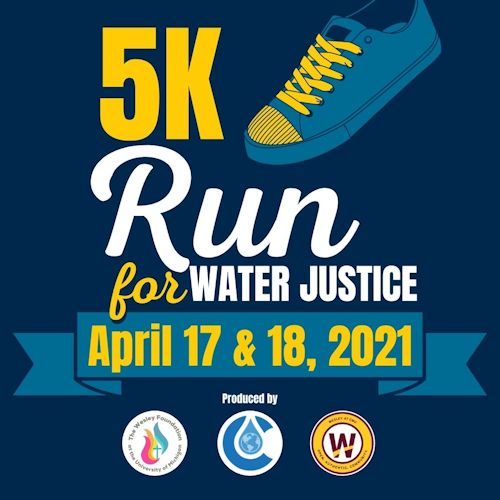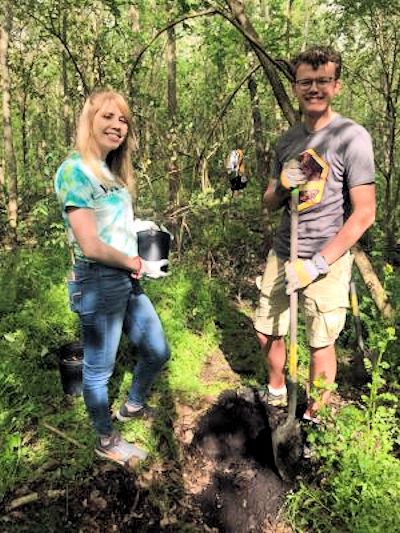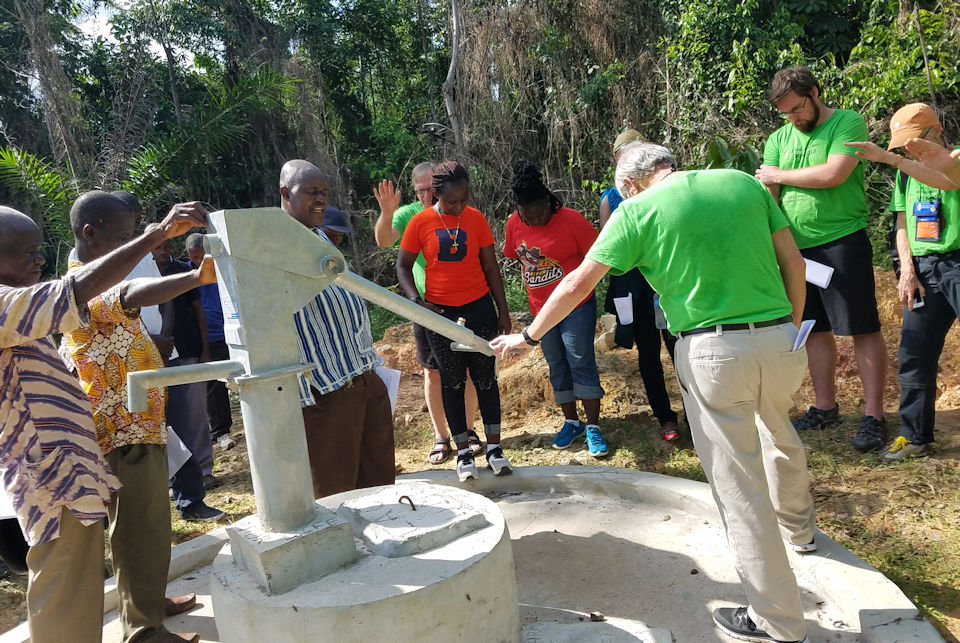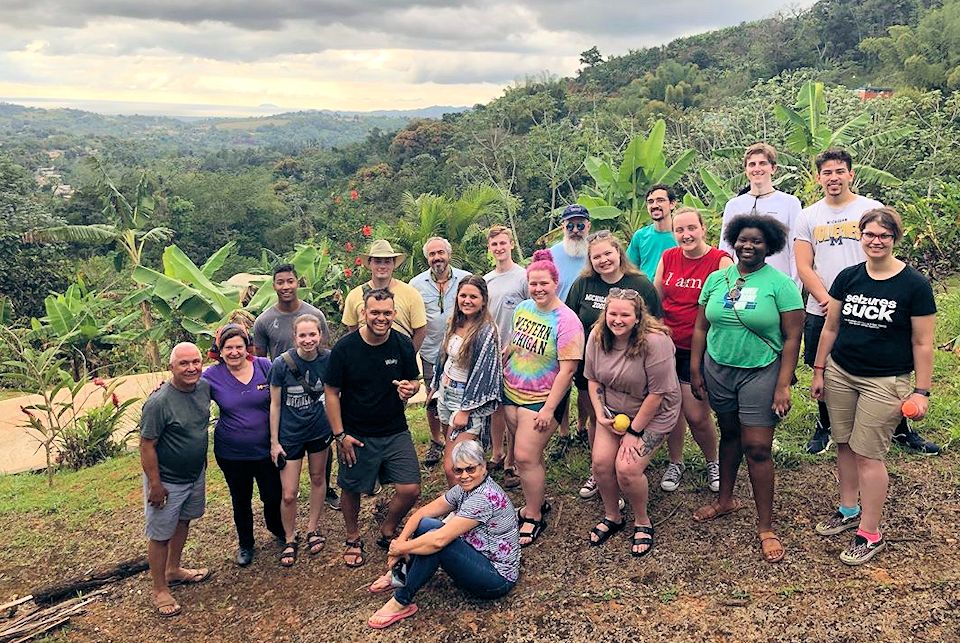Two Wesley Foundations, one in Ann Arbor and the other in Mt. Pleasant, have partnered to focus on a basic human need. Water. They invite Michigan United Methodists to a Global Water Summit, March 27 at noon ET.
DIANE BROWN
Michigan Conference Communications
Water! A basic human need! Turn a faucet and the clear, life-giving water pours forth.
But what happens when it doesn’t flow? Or even, when the flowing water is polluted? Or comes with a warning to boil first? Or breaks through a pipe or dam? Or there isn’t a faucet? Is lack of such an important life-giving resource only a problem somewhere else?
Recently we’ve seen images of frozen pipes bursting in homes and apartments in Texas and other southern locales struck by severe winter weather. Closer to home, workers and volunteers continue to clean up and rebuild after last summer’s horrific damage in Michigan when the Edenville and Sanford dams broke free. And bottled water distribution continues in Flint in response to the contamination disaster there.
What can be done?
Michigan United Methodists are invited to attend a virtual Global Water Summit March 27 at noon ET put on by the Wesley Foundations at the University of Michigan and Central Michigan University. Featuring live panel discussions and taped presentations, the three-hour conference is free of charge, though registration is required.
Krista Dover, executive director of Clean Water for the World and one of the co-sponsors of the Summit, hopes the conference will inspire others to find ways to participate in the efforts to make access to water a human right.
“Access to water is an issue we face everywhere, whether it be because of natural disasters, like what Texas is experiencing now,” Dover said, “or that access is a huge barrier in remote areas, such as what Jefferson Knight is doing in Liberia by providing wells. Clean Water for the World complements community development work that organizations and local water promoters are doing in El Salvador, Guatemala, and Haiti by providing clean water purifiers so that not only do local communities have access to water, but clean and safe water.”
Additionally, the three Summit sponsors are organizing a virtual 5K walk/run/roll/ride April 17-18 as an alternate spring break during a pandemic that has reduced travel opportunities. Michigan United Methodists also are encouraged to register for the 5K and help support Michigan area organizations, including Clean Water for the World, Flint Water Crisis, UMCOR funding for Midland flooding in 2020, and We the People of Detroit.
Where is water access an issue?
Summit keynote speakers will discuss issues at a global level and how COVID-19 has made an impact.
Pedro Arrojo-Agudo, the United Nations Special Rapporteur on the human rights to safe drinking water and sanitation, and Maude Barlow, board chair of Food and Water Watch and Blue Planet Project, are scheduled to speak.
Dover, however, points out that water issues don’t only occur in developing countries. “Residents across the state of Michigan face accessibility issues whether it is PFAs threatening the quality of water, the threat of water shutoffs for water bills in arrears, or lead and other contamination making the water undrinkable and even unusable,” she said. “What’s more is that if water is shut off to a home in Michigan for more than three days, children can be removed from the home by DCS as the home would be considered unsafe.
“I think that in developed nations we have become so accustomed to being able to have drinking water come from the tap, it is easy to think that we will always have it, especially in the Great Lakes region where we have nearly 20% of the earth’s fresh water in our area,” Dover added. “I think that we forget how easy it is to lose access to clean water through contamination, through lax environmental protection laws, through lax enforcement of said laws, and by not paying attention – because it’s easy to not pay attention to what is happening, often times until it is too late.”
Companies have tapped into the Great Lakes resources for their profits as well. Dover notes beverage companies provide a challenge. “Nestle seeks to extract more than 500,000 gallons of water each day from a well in Osceola County to bottle its Ice Mountain water brand,” she said. “It’s not the only location that Nestle extracts from. It’s not just bottled water – it is bottled beverages – ranging from beer factories that extract water along the Sonoran desert US-Mexico border leaving municipalities without water to Coca-Cola bottling plants that make soft drinks more available than water.”
What are Wesley students doing?
Students at the two Wesley Foundations have been studying water justice issues together this academic year. Audra Hudson, in her first year as director and pastor at CMU Wesley, said she was eager to join with Wesley at U-M for a virtual book study of Watershed Discipleship (edited by Ched Myers).

“Fundamentally young people today are growing up in a very different world from our parents and grandparents,” Hudson said. “We are keenly aware that our earth, with our current rate of consumption, cannot be sustained. This is looming over young adults. This keeps me up at night. (It) has informed decisions we have to make very young about careers and families – I have friends who are choosing not to have children because they don’t want them in a world that is dying.”
At U-M, the Wesley theme for the academic year is “The Water of Life.” Worship, studies and service opportunities have explored the vital themes of water in the scriptures and how water justice issues are key in our communities and world.
“Not every student is going to become an environmental scientist and be able to address water sustainability in the most direct way,” said Isabella Buzynski, a U-M senior and member of the Summit planning committee. “Nonetheless, I believe it is important for students from all fields to learn about water justice because we can all play a part in spreading important information and demanding justice for ourselves and for our neighbors. Access to clean water is a human right and should be treated as such, and the more that students understand about the issue the better they can advocate for those who are most affected.”
Tim Kobler, chaplain and director at U-M Wesley, wants Summit participants to obtain practical steps to take action. “We had seen in the news the many pollutants that are impacting our water locally – like lead in Flint, PFAs, green ooze. We believe water is a human right. We are about human rights and working toward justice for all.”
Kobler noted all programming at Wesley pivoted when the pandemic struck. “Everything went online. It also has been a gift,” he said. “Students were familiar with virtual learning formats. Our book studies have had a reach far outside our region as students can participate from afar. And we’ve been able to invite the authors and other guests who do work similar to that which is written. It has opened up the world of collaborative ministries with other Wesleys.”
Hudson also believes the partnering of the two Wesley groups has been beneficial. “It has been challenging to get folks involved due to COVID. (But this study has been) a meaningful way to have conversation about Christian care of creation in a way that worship doesn’t allow us to. It has been connective. Hopefully it has planted seeds for Wesley students and for their vocations. I hope it has spurred something that will grow.”
How else can United Methodists get involved?
Connecting participants with a network of advocates, activists, organizations and persons of faith is a goal of the Summit.
“For United Methodists across Michigan, in the heart of the Great Lakes, we can all be part of the solution for ensuring that access to clean water and the human right to water security is available both at home and abroad,” Dover noted. “There will be multiple organizations to engage with at the Summit including local organizations and international ones that they can engage with and be in mission with. Let this be part of a growing call to Methodists across the state to be part of the solution.”

For the 5K in April, Hudson is planning a safe group event with her students in Mt. Pleasant. “The 5K is an opportunity to connect in an embodied way. This will give us a way to connect with our local watershed because we’ll be walking or running or biking around it. We hope to bike to the Chippewa River. An important part of any study is to physically experience it.”
Hudson also is hoping a broad array of Michigan Methodists across the state will participate in the Summit. “The Water Summit is an opportunity for folks in our conference and young people to be introduced to water issues in our region and world. And to recognize that issues of water justice and environmental care are part of our call. Love of neighbor shouldn’t be just of humans.”
Those interested in helping to underwrite the costs of the Summit and 5K or to donate can email Pastor Tim Kobler.
Last Updated on October 31, 2023

